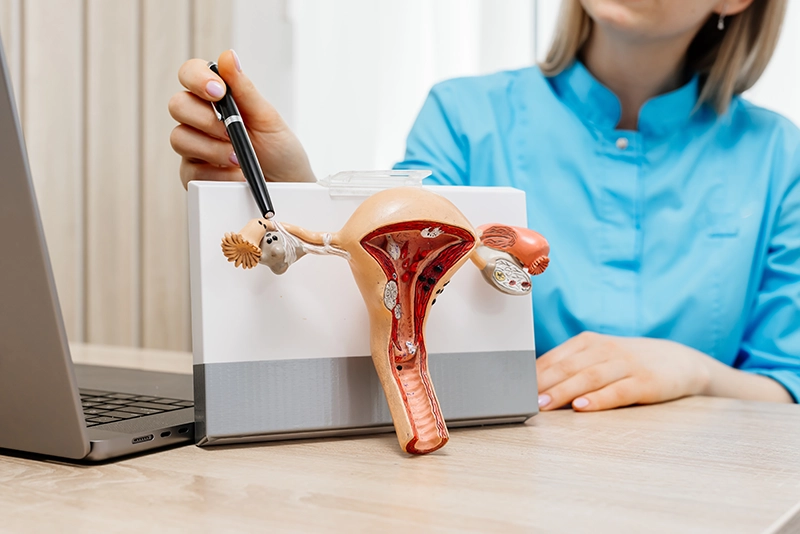Everything You Need to Know About Egg Preservation
Motherhood is a process that many women wish to experience. Thanks to medical advancements, options like egg preservation¹ have become available, enabling women to exercise their reproductive rights.
As time passes, egg quality diminishes, presenting challenges for women who wish to start a family but want to achieve personal goals first.
In this blog, we’ll clarify questions about egg preservation to inform and offer this option to those who may benefit from it.²⁻⁴
What Is Egg Preservation?
Egg preservation is an assisted reproductive technique that uses cryopreservation to store eggs in liquid nitrogen capsules at temperatures as low as -130ºC, preserving them for future use when the individual is ready.²⁻⁴
How Does Fertility Preservation Through Egg Vitrification Work?
- Health Assessment
- Various tests are conducted to evaluate the patient’s health and ensure the procedure’s success.²
- Ultrasound: Performed during menstruation to examine antral follicles (the sacs containing the eggs). A normal ovarian reserve typically includes 10-20 antral follicles in both ovaries.
- Anti-Müllerian Hormone (AMH) Test: Measures AMH levels to assess ovarian reserve and fertility in women.⁵
- Various tests are conducted to evaluate the patient’s health and ensure the procedure’s success.²
- Ovarian Stimulation
- If an adequate number of follicles are present, ovarian stimulation begins to increase egg production for preservation.
- This process, monitored with ultrasounds, lasts approximately 10-12 days.³⁴⁶
- If an adequate number of follicles are present, ovarian stimulation begins to increase egg production for preservation.
- Egg Retrieval
- Mature eggs are extracted while the patient is sedated.¹⁻³
- Egg Quality Analysis
- Extracted eggs are carefully examined to ensure they meet quality standards before vitrification.
- Egg Vitrification
- Selected eggs are submerged in a sucrose solution to remove water and prevent crystal formation, then frozen in liquid nitrogen at -196ºC and stored in special tanks.³

When Is Fertility Preservation Recommended?
Egg preservation is particularly recommended in the following cases:
- Cancer Patients Planning Motherhood
- Treatments like chemotherapy and radiotherapy can severely affect the body, potentially damaging egg-developing cells.⁵⁶
- Preserving eggs before treatment allows patients to use their own genetic material for future pregnancies without needing donor eggs.
- Postponed Motherhood Beyond the Recommended Age
- Women are born with a finite number of eggs, which diminish in quantity and quality over time. Freezing eggs ensures they remain viable for fertilization regardless of age.²³⁴
- Women Undergoing Ovarian Surgery
- Procedures like endometriosis treatment may compromise ovarian tissue. Preserving eggs secures their reproductive options.
- Health Conditions Impacting Ovarian Reserve
- Autoimmune diseases or a history of premature ovarian failure may warrant egg preservation to maintain fertility options.¹⁻³
- Low Ovarian Reserve
- Women with low AMH levels can preserve their eggs, increasing the likelihood of successful reproduction through assisted reproductive techniques.³⁴⁶
What Are the Advantages of Egg Preservation?
- Extends the Possibility of Motherhood
- Whether due to health conditions or personal and professional goals, egg preservation allows women to conceive with their own eggs even if their bodies no longer produce them.⁶
- A Safe Procedure
- The process is carefully controlled at every stage, especially when performed by a reproductive medicine expert.
- Ensures High-Quality Eggs
- Advanced technology and expertise in reproductive biology ensure high success rates for preserved eggs.⁴⁵
About UR-Crea:
At UR-Crea Reproductive Medicine, we have over 30 years of experience offering treatments such as in vitro fertilization, ovarian rejuvenation, egg donation, and the ROPA method.
We follow personalized diagnostic protocols with a multidisciplinary team of specialists in gynecology, reproductive biology, embryology, perinatology, anesthesiology, and nursing.
We turn dreams of parenthood into reality with ethical, professional, and human-centered care. Visit us to learn more!
References:
- Cáncer.gov. Definición de congelamiento de óvulos. [Internet]. Consulted in October 2024. Available at: https://www.cancer.gov/espanol/publicaciones/diccionarios/diccionario-cancer/def/congelamiento-de-ovulos
- Reproducción asistida. La preservación de la fertilidad: congelar óvulos y esperma [Internet]. Consulted in October 2024. Available at: https://www.reproduccionasistida.org/preservacion-de-la-fertilidad/#que-es-la-vitrificacion-de-ovulos
- Quiron salud. La congelación de óvulos [Internet]. Consulted in October 2024. Available at: https://www.quironsalud.com/blogs/es/aventura-madre/congelacion-ovulos-alternativa-segura-permite-preservar-fer
- Reproducción asistida ¿Qué es la vitrificación de óvulos? [Internet]. Consulted in October 2024. Available at: https://www.reproduccionasistida.org/vitrificacion-de-ovulos/#ventajas-de-la-vitrificacion-de-ovulos
- Blog UR-Crea. Salúd ovárica: cómo la hormona antimulleriana y los estrógenos actúan en la reproducción. [Internet]. Consulted in October 2024. Available at: https://ur-crea.mx/2024/10/07/hormona-anti-mulleriana-y-sus-aportes/
- UR-Crea. Tratamiento: preservación de la fertilidad. [Internet]. Consulted in October 2024. Available at: https://ur-crea.mx/tratamiento/preservacion-de-la-fertilidad/







